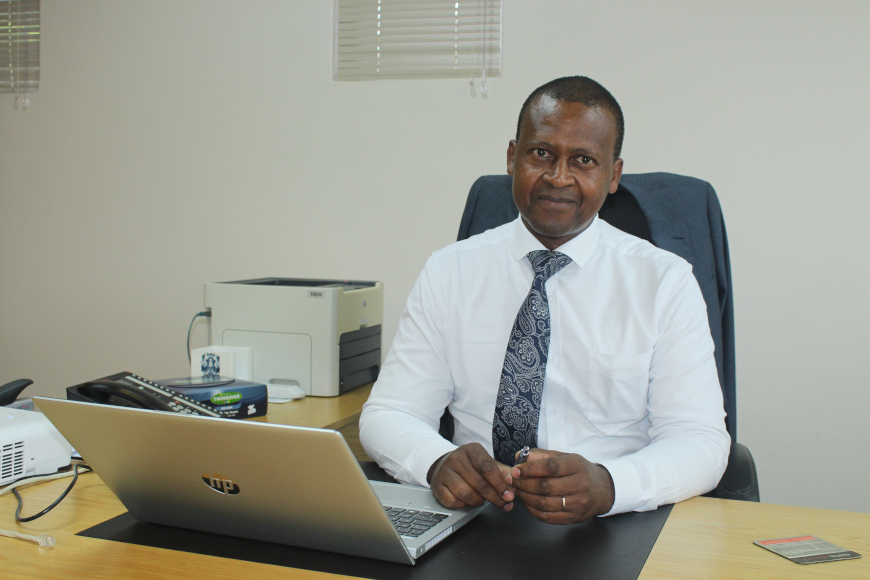Some of the key success factors for a Chief Risk Officer (CRO) role, in any organisation include, a sound business acumen, keen stakeholder expectations management, and the ability to swing risk-related conversations away from the technical space and more towards simplicity or practicality. The appetite for understanding risks from the perspective of the various role players in the respective portfolios – faculties, ITSS communications and marketing, HR, OHS, etc. – is a basic point of departure or licence to practice for a CRO.
For us, as an institution (DUT), the CRO role, which the new incumbent, Mr Sikhuthali Nyangintsimbi, has settled into, is a vital one. And from his perspective, he believes that further socialisation of enterprise risk management (ERM) across the DUT and deepening the risk culture of the institution is his mission.
Mr Nyangintsimbi assumed duty as the new Chief Risk Officer on 1 September 2019. He holds an MPhil in Internal Auditing and a Master of Business Leadership (MBL) from the University of Pretoria and the University of South Africa respectively. He obtained his BCom from Walter Sisulu University and also has a few professional certificates that are relevant to his field. That he is currently pursuing his PhD, which focuses on the integration of strategic management and risk culture in the higher education sector, perhaps explains the choice of his priority for DUT.
His work experience spans more than 30 years across various industries, both in the private and the public sectors, and predominantly in the oil/petroleum industry. This has largely been in the governance space, viz. risk management, auditing and business controls, and he sits on oversight committees as well.
In terms of cross-cultural literacy, his professional activities and assignments have afforded him the honour to interact with a broader spectrum of stakeholders in various countries. These include Belgium, Japan, Malaysia, the United Kingdom, and more than 10 sister African countries. “I have been to various countries across the continent which also makes me more alert to matters pertaining to diversity and inclusivity,” he says.
Speaking about the juncture at which he assumes his new role, Mr Nyangintsimbi believes it is not every day that an organisation or institution engages on formulating a strategy outlook for the next 10 to 15 years.
“The fact that our institution is embarking on the DUT 2030 Strategy presents an opportune moment. That is, in light of this decided upon strategic direction, as well as pertinent priorities and objectives, an important question then becomes ‘so what are the risks and opportunities pertaining to that strategic direction?’. This undoubtedly constitutes a rare key juncture for any organisation. For any risk practitioner, it is a defining moment, from a career enrichment perspective”, he says.
He believes that such career enrichment, for a risk practitioner, is realised also through seizing any opportunity for the ERM Department to demonstrate a partnering approach in relation to the broader institution, and co-journeying with the various role players in Faculties as well as Administration/Support.
Mr Nyangintsimbi envisions deepening the risk culture of the institution.
“You can go to any country, the higher education sector is often accused of being too inward-looking, overly risk averse, and inordinately hierarchical. So, despite the fact that, as a sector, we deliver graduates in risk management – and other areas – whom we encourage to be innovative and forward looking, we actually practise the opposite here at home (as a sector). I am hoping that during the next five years, within DUT in particular that will be the top priority. We will have journeyed meaningfully towards deepening the risk culture,” he says.
He says that in an effort to make this collective aspiration more concrete, there is also a need to develop a risk maturity model for the institution. Importantly, it will not be an off-the-shelf model, but rather a cocktail of the best components from various models available in the market, which will be synthesised into a DUT specific one. And, of course, a common view on the time horizon, over which the pertinent key milestones have to be achieved, will be shaped.
Welcoming his appointment, DUT Principal and Vice-Chancellor, Professor Thandwa Mthembu, said Mr Nyangintsimbi’s rich experience in enterprise risk management will bring new insights, approaches and methodologies in how best DUT can collectively mitigate organisational risks and jointly boost the DUT brand.
Finally, that he is a member of the Institute of Risk Management Committee of South Africa (IRMSA) and serves on the Institute of Internal Auditors (IIASA), wherein he is also Chairperson of the Exams Committee, makes him a well- rounded DUT Ambassador.
Pictured: Mr Sikhuthali Nyangintsimbi
Waheeda Peters


